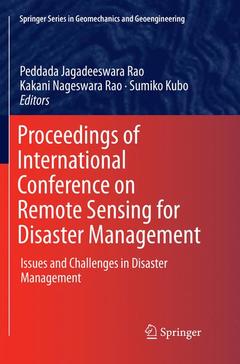Description
Proceedings of International Conference on Remote Sensing for Disaster Management, Softcover reprint of the original 1st ed. 2019
Issues and Challenges in Disaster Management
Springer Series in Geomechanics and Geoengineering Series
Language: English
Subject for Proceedings of International Conference on Remote...:
Publication date: 01-2019
Support: Print on demand
Publication date: 06-2018
Support: Print on demand
Description
/li>Contents
/li>Comment
/li>
The natural disasters are the killer agents which can/can't be predicted even though we have modern technology. Every year, in one place or another, disasters striking which is devastating the area and surroundings, leading to ecological disruption besides huge loss of life and property. India is vulnerable to cyclones, landslides/avalanches, earthquakes, floods, droughts, forest fires, epidemics, etc. The 5700-km long coast of India, with its dense population is vulnerable to cyclones/low depressions, tsunamis, etc. The 2400-km long rugged Himalayan terrain is vulnerable to landslides, avalanches and earthquakes. India is not only vulnerable to natural disasters, it is also experiencing industrial accidents. The Bhopal Gas tragedy is one of the major man-made disasters in the world. The state of Andhra Pradesh has 970-km long coastline with two major rivers, etc. The conference is conducted in Visakhapatnam, is famous for industries and tourism. Recently, several industrial accidents took place, besides major natural disasters like Hud-Hud, etc. Disaster management shall be implemented from the grass root level in vulnerable areas to improve the capacity building, so as to minimize the losses. The capacity building coupled with technology results in reduction of loss of life and property.




